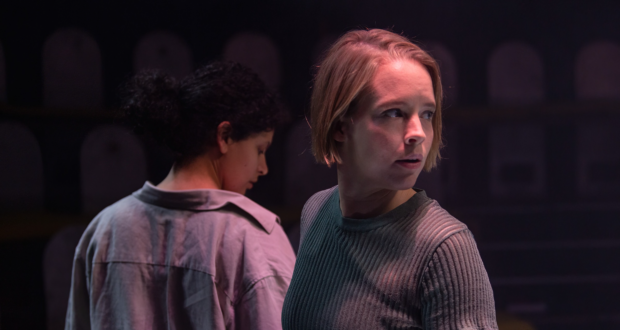A nuanced tale of truth, power, and sexuality. Summary
Rating
Unmissable!
SAP is a story that illustrates how a small lie can blow out of proportion in someone’s own mind. As soon as Jessica Clark, the captivating self-deprecating heroine, begins by addressing the audience, filling us in on mundane office life, you immediately understand her character. Breaking the fourth wall is the basis of the whole show, as she invites us in on her more intimate thoughts. At moments, it’s like we are her best friend, her diary, or even just a window into her psyche, but even then she’s hesitant to share everything. She’s a hilarious storyteller, yet is also simultaneously capable of expressing such vulnerability in a way that makes your heart sink in dread.
Her counterpart, Rebecca Banatvala, effectively multi-roles as every other character, most notably the girlfriend and ‘the guy’. She is able to produce such distinctive characters with only minor changes in body language and voice. The characters are likeable too, people we are familiar with, these aren’t archetypes, making it all the more sinister as the story progresses. They’re toxic in their own way, the script able to understand the nuance and subtlety of being able to use a lie to maintain power, without coming across as a villain from the beginning. The two work incredibly well together, whilst Banatvala plays the supporting role, her presence commands so much attention.
The common semantics of trees appear throughout; the title itself and recurring themes of roots, planting her in the ground. Mentions of decay and trees overtaking a house, almost like nature is overtaking. These moments, along with more conversation-like script work well together, the poetic descriptions of her being ‘rooted’ into the ground in fear help the audience understand her psyche. Moreso, they help her deal with what is going on, she’s able to distance herself from the situation and focus on what her body is feeling- almost like a defence mechanism.
Similarly, her bisexuality, which is arguably the catalyst to further problems, is a fight between her natural and taught instincts. Her attraction to men is almost an animalistic urge, as opposed to women, a softer, more comforting love. She jokes about going out for ‘ladies night’, when her friends say she can’t decide that beforehand, otherwise that would make sexuality a choice. The way she describes her attraction is notably less eloquent than other moments- its chatty and familiar. Whilst it makes sense to her, it’s confusing to be able to express it outwardly. She’s not a scholar, she’s just trying to tell us what she feels in a way language cannot. Maybe if she was able to, the rest of the story wouldn’t happen. We’ll never know.
The stage itself is in traverse, with no stage setting and minimal use of props. The ability to look over and see the other side of the audience, almost becoming included, helps to aid the diary nature of Clark’s monologue. Clever lighting and sound is enough to capture where the story is taking place each time. They complement the rhythmic-like script, creating meaningful beats and pauses which only add to the rising tension of the storyline.
Rafaella Marcus has produced such a beautiful and complex script, conversational, poetic, funny and emotional, all in the space of an hour. The actors are incredible at bringing it to life in a way that makes it feel a real privilege to be a part of the audience.
Written by: Rafaella Marcus
Directed by: Jessica Lazar
Set & costume design by: Rūta Irbīte
Lighting design by: David Doyle
Composed and sound design by: Tom Foskett-Barnes
Movement direction by: Jennifer Fletcher
SAP plays at Soho Theatre until 22 April. Further information and bookings here.
 Everything Theatre Reviews, interviews and news for theatre lovers, London and beyond
Everything Theatre Reviews, interviews and news for theatre lovers, London and beyond



